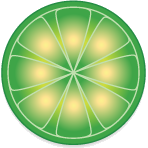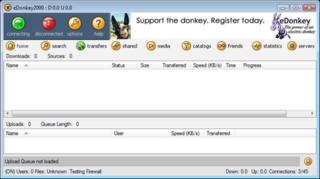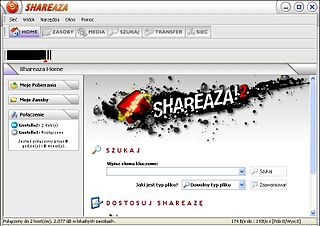Gnutella is a peer-to-peer network protocol. Founded in 2000, it was the first decentralized peer-to-peer network of its kind, leading to other, later networks adopting the model.

LimeWire was a free peer-to-peer file sharing client for Windows, MacOS, Linux and Solaris. Created by Mark Gorton in 2000, it was most prominently a tool used for the download and distribution of pirated materials, particularly pirated music. In 2007, LimeWire was estimated to be installed on over one-third of all computers globally.

Justin Frankel is an American computer programmer best known for his work on the Winamp media player application and for inventing the Gnutella peer-to-peer network. Frankel is also the founder of Cockos Incorporated, which creates music production and development software such as the REAPER digital audio workstation, the NINJAM collaborative music tool and the Jesusonic expandable effects processor. In 2002, he was named in the MIT Technology Review TR100 as one of the top 100 innovators in the world under the age of 35.

Shareaza is a peer-to-peer file sharing client running under Microsoft Windows which supports the gnutella, Gnutella2 (G2), eDonkey, BitTorrent, FTP, HTTP and HTTPS network protocols and handles magnet links, ed2k links, and the now deprecated gnutella and Piolet links. It is available in 30 languages.

eDonkey2000 was (is) a peer-to-peer file sharing application developed by US company MetaMachine, using the Multisource File Transfer Protocol. It supported both the eDonkey2000 network and the Overnet network.

A distributed hash table (DHT) is a distributed system that provides a lookup service similar to a hash table. Key–value pairs are stored in a DHT, and any participating node can efficiently retrieve the value associated with a given key. The main advantage of a DHT is that nodes can be added or removed with minimum work around re-distributing keys. Keys are unique identifiers which map to particular values, which in turn can be anything from addresses, to documents, to arbitrary data. Responsibility for maintaining the mapping from keys to values is distributed among the nodes, in such a way that a change in the set of participants causes a minimal amount of disruption. This allows a DHT to scale to extremely large numbers of nodes and to handle continual node arrivals, departures, and failures.
BitTorrent, also referred to as simply torrent, is a communication protocol for peer-to-peer file sharing (P2P), which enables users to distribute data and electronic files over the Internet in a decentralized manner. The protocol is developed and maintained by Rainberry, Inc., and was first released in 2001.
MLDonkey is an open-source, multi-protocol, peer-to-peer file sharing application that runs as a back-end server application on many platforms. It can be controlled through a user interface provided by one of many separate front-ends, including a Web interface, telnet interface and over a dozen native client programs.

GNUnet is a software framework for decentralized, peer-to-peer networking and an official GNU package. The framework offers link encryption, peer discovery, resource allocation, communication over many transports and various basic peer-to-peer algorithms for routing, multicast and network size estimation.

Gnutella2, often referred to as G2, is a peer-to-peer protocol developed mainly by Michael Stokes and released in 2002.
Kademlia is a distributed hash table for decentralized peer-to-peer computer networks designed by Petar Maymounkov and David Mazières in 2002. It specifies the structure of the network and the exchange of information through node lookups. Kademlia nodes communicate among themselves using UDP. A virtual or overlay network is formed by the participant nodes. Each node is identified by a number or node ID. The node ID serves not only as identification, but the Kademlia algorithm uses the node ID to locate values.

Magnet is a URI scheme that defines the format of magnet links, a de facto standard for identifying files (URN) by their content, via cryptographic hash value rather than by their location.
The Kad network is a peer-to-peer (P2P) network which implements the Kademlia P2P overlay protocol. The majority of users on the Kad Network are also connected to servers on the eDonkey network, and Kad Network clients typically query known nodes on the eDonkey network in order to find an initial node on the Kad network.
A BitTorrent tracker is a special type of server that assists in the communication between peers using the BitTorrent protocol.
GnucDNA was a software library for building peer-to-peer applications. It provides developers with a common layer to create their own Gnutella or Gnutella2 client or network. As a separate component, GnucDNA can be updated independently of the client, passing down improvements to the applications already using it.

In cryptography and computer science, a hash tree or Merkle tree is a tree in which every "leaf" (node) is labelled with the cryptographic hash of a data block, and every node that is not a leaf is labelled with the cryptographic hash of the labels of its child nodes. A hash tree allows efficient and secure verification of the contents of a large data structure. A hash tree is a generalization of a hash list and a hash chain.
The following is a general comparison of BitTorrent clients, which are computer programs designed for peer-to-peer file sharing using the BitTorrent protocol.
Peer-to-peer file sharing (P2P) systems like Gnutella, KaZaA, and eDonkey/eMule, have become extremely popular in recent years, with the estimated user population in the millions. An academic research paper analyzed Gnutella and eMule protocols and found weaknesses in the protocol; many of the issues found in these networks are fundamental and probably common on other P2P networks. Users of file sharing networks, such as eMule and Gnutella, are subject to monitoring of their activity. Clients may be tracked by IP address, DNS name, software version they use, files they share, queries they initiate, and queries they answer to. Clients may also share their private files to the network without notice due to inappropriate settings.

Phex is a peer-to-peer file sharing client for the gnutella network, released under the terms of the GNU General Public License, so Phex is free software. Phex is based on Java SE 5.0 or later.
Mainline DHT is the name given to the Kademlia-based distributed hash table (DHT) used by BitTorrent clients to find peers via the BitTorrent protocol. The idea of using a DHT for distributed tracking in BitTorrent was first implemented in Azureus 2.3.0.0 in May 2005, from which it gained significant popularity. Unrelated but around the same time, BitTorrent, Inc. released a similar DHT into their client called Mainline DHT, and thus popularized the use of distributed tracking in the BitTorrent protocol. Measurement showed that by 2013, the concurrent number of users of Mainline DHT is from 16 million to 28 million, with intra-day changes of at least 10 million.









